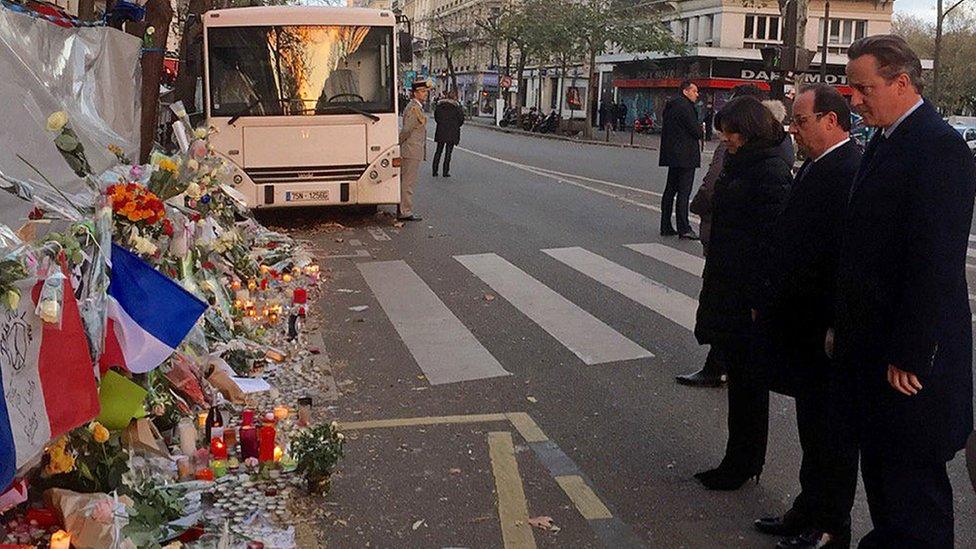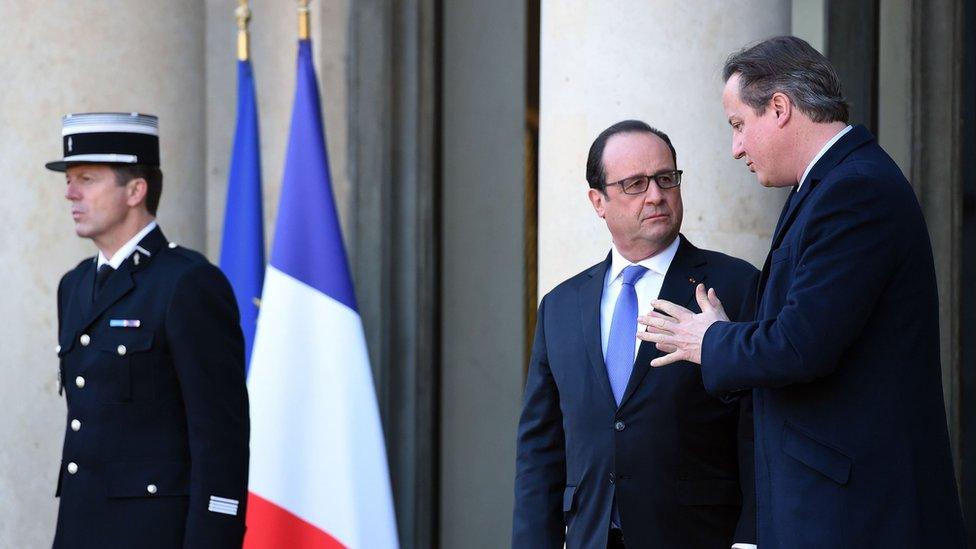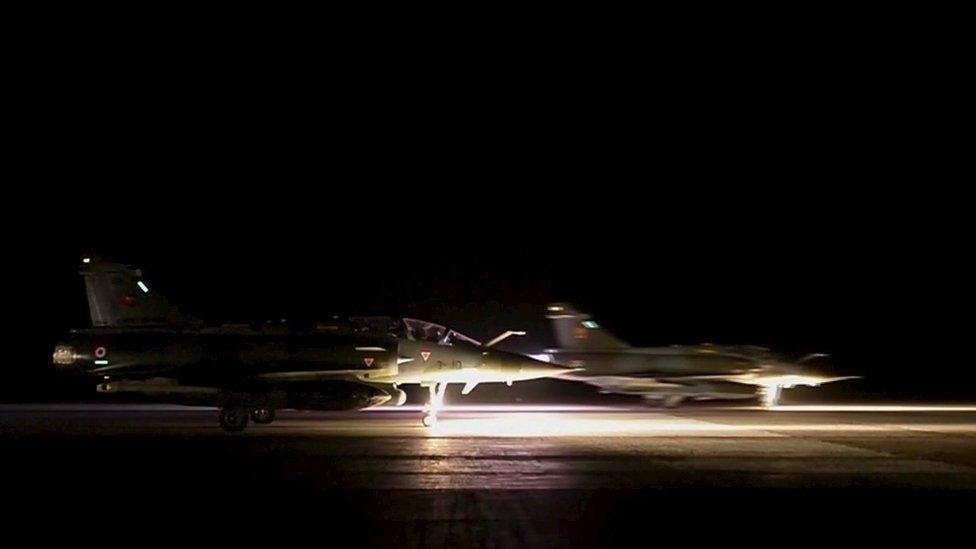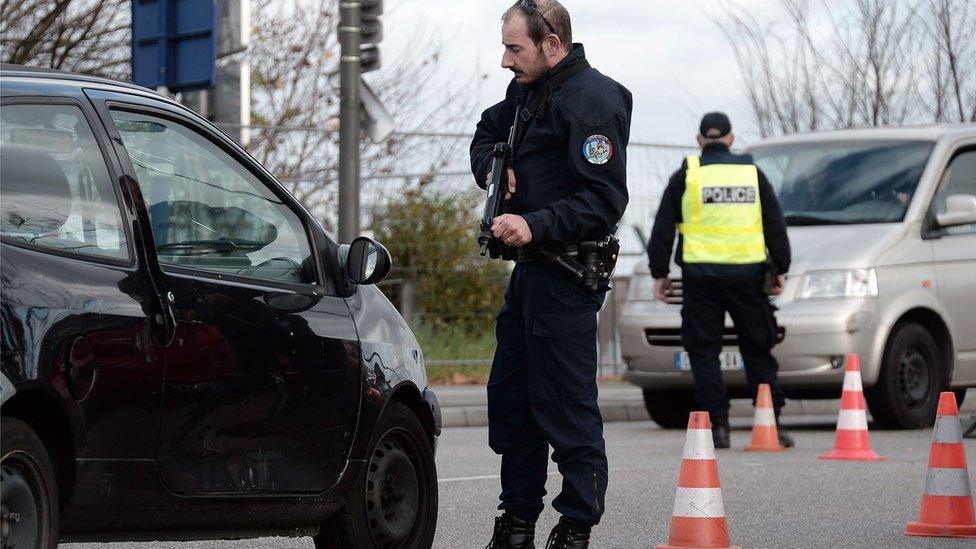Paris attacks: President Hollande's search for allies
- Published

Francois Hollande and David Cameron visited a makeshift memorial to the victims at the Bataclan theatre on Monday morning
It was only just light when the French president led his British guest to the Bataclan site.
For David Cameron, in Paris for private talks and public declarations, this wordless gesture was perhaps the most important statement of all.
Together with his host, he laid a single white rose at the makeshift memorial outside the concert hall where 89 people, including one British man, were killed on 13 November.
But President Francois Hollande is looking for more than symbolic solidarity from his allies. Over the past ten days, he's repeatedly said his country is "at war" with the so-called Islamic State, and has intensified air strikes over IS targets in Syria. Now he wants to know what his British ally will do to help.
Europe's two military giants have both carried out strikes in Iraq, and British forces have helped with intelligence and refuelling over Syria. But so far the UK Parliament has refused to sanction RAF air strikes in Syria.
Mr Hollande may well be hoping that the UN Security Council resolution last week, which called on member states to take "all necessary measures" to challenge IS in Iraq and Syria, will have changed Mr Cameron's assessment and lead him to ask parliament again.

The two leaders held talks at the Elysee Palace
The prime minister, who is due to present a comprehensive defence plan to parliament later this week, gave a strong personal endorsement to the French leader's stance.
"I firmly support the action that President Hollande has taken to strike (IS) in Syria and it is my firm conviction that Britain should do so too," he said.
He also offered France the use of Britain's Akrotiri military base in Cyprus to help with operations and refuelling.
But this is just the start of Mr Hollande's week of diplomacy. After his meeting with David Cameron, he flies to Washington to discuss the situation with US President Barack Obama, before coming back to Paris for a meeting with the German Chancellor Angela Merkel on Wednesday.
The emphasis in each meeting will be slightly different. Aside from the need to assess the US-led military strategy in the Middle East, there are growing calls from European leaders to improve intelligence and data sharing.
Security forces in both France and Belgium have been embarrassed by revelations that key suspects behind the Paris attacks moved around freely in the weeks leading up to the assaults, and in the days afterwards, even passing through checkpoints with apparent ease.

French planes have been taking action against IS targets in Syria
And hanging over all the discussion of military and technical co-ordination is the elusive goal of a political solution in Syria which could help eradicate the militants' territory and source of revenue. That is likely to be central to Thursday's talks in Moscow, between Mr Hollande and Vladimir Putin, his fourth foreign leader in as many days.
As experts point out, France - with its historically cordial ties to Russia, its membership of Nato, and its presence in the Middle East region - is in a unique position to help procure an agreement, and with it greater security at home.
In the meantime, Mr Hollande has a few other things on his mind, not least preparing for the UN Climate Conference which begins at the end of the month. Oh, and the regional elections, in which Mr Hollande's Socialist party is tipped to come third, behind the main centre-right opposition and the far-right Front National.
If nothing else, Mr Hollande can perhaps take comfort from an eight percentage point spike in his previously dismal approval ratings, which now hover around the 30% mark. Whether he manages to maintain that figure as time goes on and attention returns to the economy is another question.
As one newspaper article put it this weekend, three years into his term of office, President Hollande is seen as "a bad captain in a fair wind, but a good leader for tough times."

France has set up checkpoints on its borders in the wake of the attacks